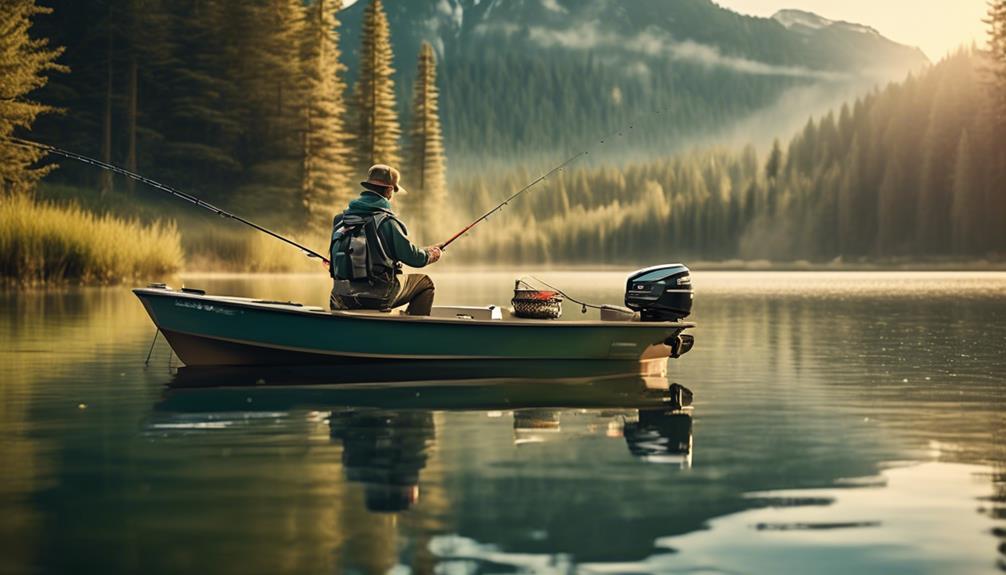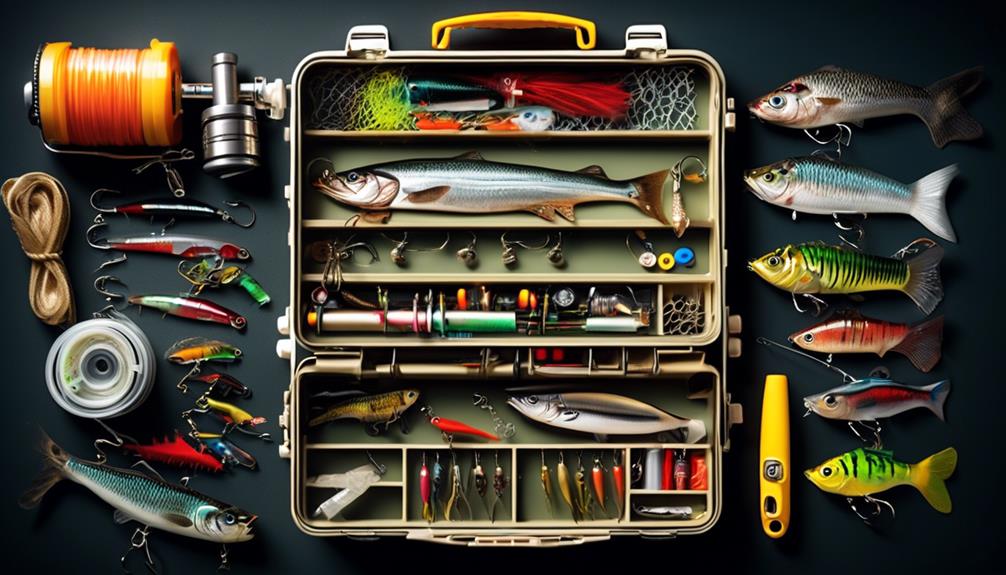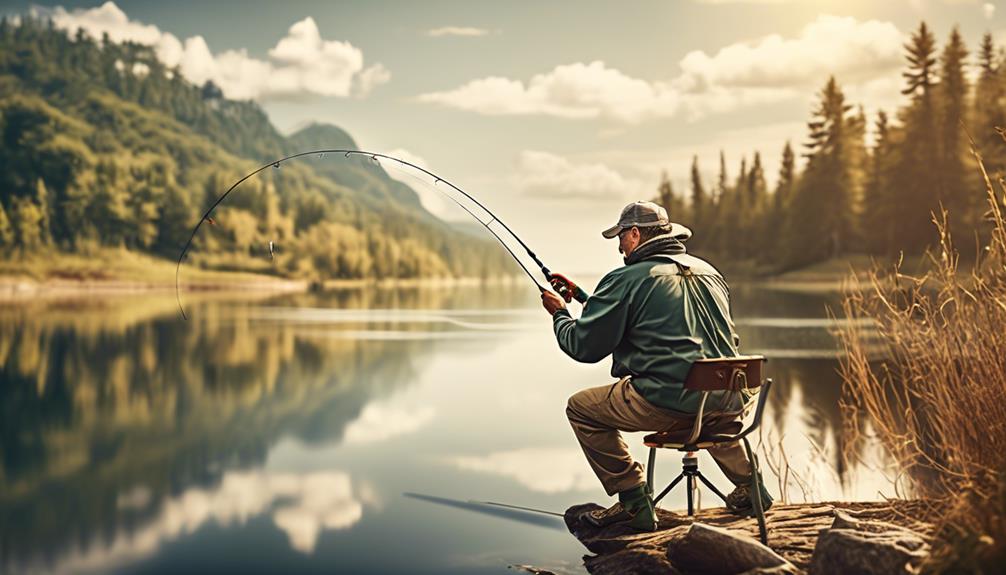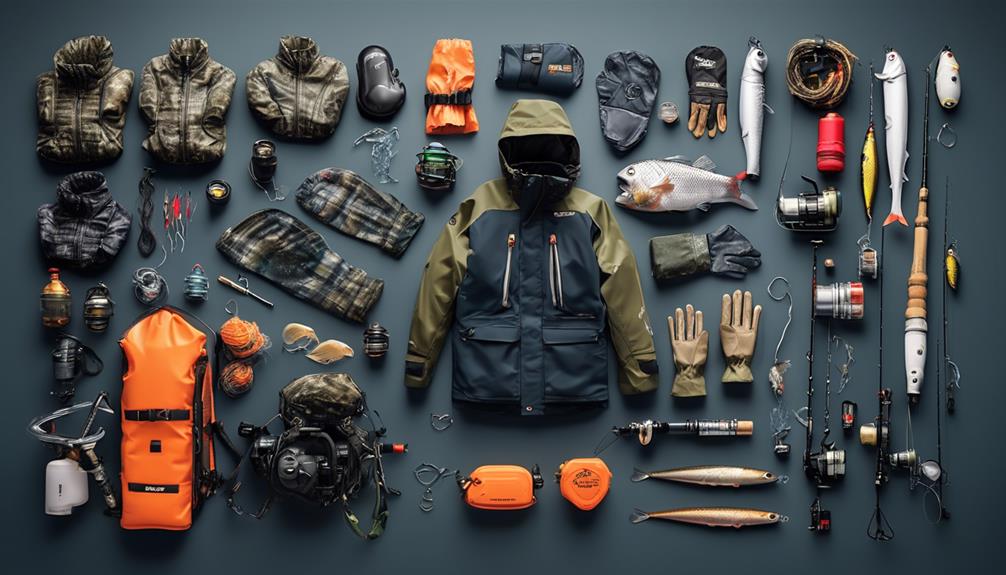When it comes to freshwater fishing, choosing the right gear can make all the difference in your angling experience. Did you know that having the right equipment can significantly increase your chances of landing that prized catch?
From rods and reels to electronic gadgets, the world of angling gear is vast and varied. But fear not, as we're here to guide you through the top picks for each category, helping you make informed decisions on your next fishing excursion.
So, whether you're a seasoned angler or just starting out, get ready to elevate your fishing game with the best gear for freshwater fishing.
Rods and Reels
Looking for the perfect rod and reel combo for your freshwater fishing adventures? When it comes to choosing the right rod and reel combo, there are a few key factors to consider.
First, think about the type of fish you'll be targeting and the specific techniques you'll be using. This will help you determine the best rod length, action, and power, as well as the ideal reel size and gear ratio for your needs.
Once you've selected the right rod and reel combo, it's important to prioritize rod and reel maintenance to keep your gear in top condition. Regularly clean your rod and reel to remove any dirt, debris, or salt buildup that could cause damage. Inspect the rod for any signs of wear and tear, and ensure that the reel is properly lubricated to maintain smooth performance.
To extend the lifespan of your rod and reel, store them properly when not in use. Keep your rod in a secure rod holder or rack to prevent warping, and store your reel in a cool, dry place to avoid corrosion. Additionally, consider investing in a protective case or cover for both your rod and reel to safeguard them from potential damage during transportation.
Fishing Lines
When it comes to your freshwater fishing gear, the fishing line is a crucial component that directly impacts your angling success. Choosing the right fishing line can make a significant difference in your ability to reel in that prized catch.
Here are some key factors to consider when selecting a fishing line:
- Line strength and durability: The line's strength is crucial as it determines its ability to withstand the weight and fight of the fish. Durability is also important as it ensures that the line can endure the rigors of angling, especially in rough terrains or when dealing with feisty fish.
- Knot tying and casting techniques: A good fishing line should allow for secure knot tying to ensure that your hooks, lures, and swivels stay in place. Additionally, the line should facilitate smooth and accurate casting, enabling you to reach your desired fishing spots with ease.
- Material and flexibility: Different fishing lines are made from materials like monofilament, fluorocarbon, or braided lines, each with its own unique properties. The flexibility of the line is also important as it affects how it performs during casting and when reeling in a catch.
- Visibility and buoyancy: Consider the visibility and buoyancy of the fishing line based on the water conditions and the type of fish you're targeting. A highly visible line may spook some fish, while buoyancy can affect the depth at which your bait or lure is presented.
Selecting the right fishing line tailored to your fishing style and target species can significantly enhance your angling experience.
Hooks and Lures
To effectively attract and catch freshwater fish, selecting the right hooks and lures is essential for your angling success. When it comes to bait selection, it's important to consider the specific fish species you're targeting. Different fish have different feeding habits, so choosing the appropriate bait is crucial. For example, if you're aiming for bass, using plastic worms or crankbaits can be effective. On the other hand, trout are often enticed by live bait such as worms or insects. Understanding the behavior of the fish you're targeting will help you make the best bait selection.
Fishing techniques also play a significant role in hook and lure effectiveness. For instance, when using topwater lures, mastering the 'walk-the-dog' technique can mimic the movements of prey, enticing fish to strike. Similarly, adjusting the retrieval speed and depth when using diving lures can make a difference in attracting fish. Adapting your techniques based on the conditions and the behavior of the fish will increase your chances of a successful catch.
Catch and release practices are essential for preserving fish populations and the environment. Using barbless hooks can make it easier to release fish without causing unnecessary harm. Additionally, being mindful of the environmental impact of the lures you choose is crucial. Opting for biodegradable or eco-friendly lures can help minimize the ecological footprint of your angling activities. By considering bait selection, fishing techniques, and the impact on the environment, you can enhance your angling experience while promoting sustainable fishing practices.
Tackle Boxes
Your tackle box serves as a crucial organizational tool for keeping your angling gear easily accessible and well-maintained. Proper tackle box organization and maintenance are essential for an enjoyable fishing experience. Here are some tips to help you keep your tackle box in top shape:
- Organize by Type: Sort your lures, hooks, sinkers, and other tackle by type and use small containers or dividers to keep everything in its place. This makes it easier to find what you need during a fishing trip and prevents tangles and damage to your gear.
- Regular Maintenance: Check your tackle box regularly for any signs of rust, damage, or wear and tear. Replace rusty hooks, sharpen dull ones, and oil any moving parts to ensure everything is in working order.
- Customization: Consider customizing your tackle box to better suit your needs. You can add extra dividers, foam inserts for hook storage, or even create DIY modifications such as attaching a line cutter or a small LED light for night fishing.
- DIY Modifications: Get creative and personalize your tackle box. You can paint it with waterproof paint to prevent rust, add stickers or labels for easy identification, or even attach a small magnet to keep metal tools in place.
Fishing Tools
Keeping your fishing tools well-maintained is essential for a successful angling experience. Tackle maintenance is crucial to ensure that your gear is in top condition for your fishing trips. Begin by inspecting your tackle box for any rust, damage, or worn-out parts. Replace rusty hooks, swivels, or damaged lures to avoid any disappointments while out on the water.
Regularly oiling and cleaning your fishing reels will also prolong their lifespan and maintain their smooth performance. It's important to organize your tackle box after each use, removing any debris or tangled lines to keep your gear in good shape for the next outing.
In addition to maintaining your tackle, it's essential to handle fish properly to ensure their well-being. Always wet your hands before handling fish to avoid removing their protective slime layer, which can lead to infections and a higher chance of mortality after release. Use barbless hooks to make unhooking fish easier and less harmful to them.
If you need to handle a fish, support its body properly and minimize air exposure to increase its chances of survival after being released.
Electronic Gadgets
Inspecting your electronic gadgets for any damage or wear is crucial to ensure they're in top condition for your fishing trips. Here are some essential electronic gadgets that can enhance your freshwater fishing experience:
- GPS navigation: A reliable GPS navigation system is a game-changer for freshwater fishing. It allows you to mark productive fishing spots, navigate through intricate waterways, and safely find your way back to the shore. Look for a waterproof and durable GPS device that can withstand the demands of fishing in diverse environments.
- Fish finders: These electronic devices utilize sonar technology to locate fish underwater, making them indispensable for anglers. Modern fish finders come with advanced features like side-scanning and down-imaging, providing detailed information about the underwater terrain and fish activity. Invest in a high-quality fish finder to maximize your catch and make your fishing trips more productive.
- Smartphone or tablet: Your smartphone or tablet can serve as a versatile tool for fishing. You can use fishing apps for weather updates, tide information, and mapping. Additionally, these devices can be used to take photos of your catches, share your fishing experiences on social media, and even stream live updates from the water.
- Portable power bank: With the reliance on electronic gadgets, it's crucial to have a portable power bank to keep your devices charged throughout your fishing expedition. Opt for a rugged, waterproof power bank that can withstand the rigors of outdoor adventures. Having a fully charged power bank ensures that your essential electronic gadgets remain operational when you need them the most.
Clothing and Footwear
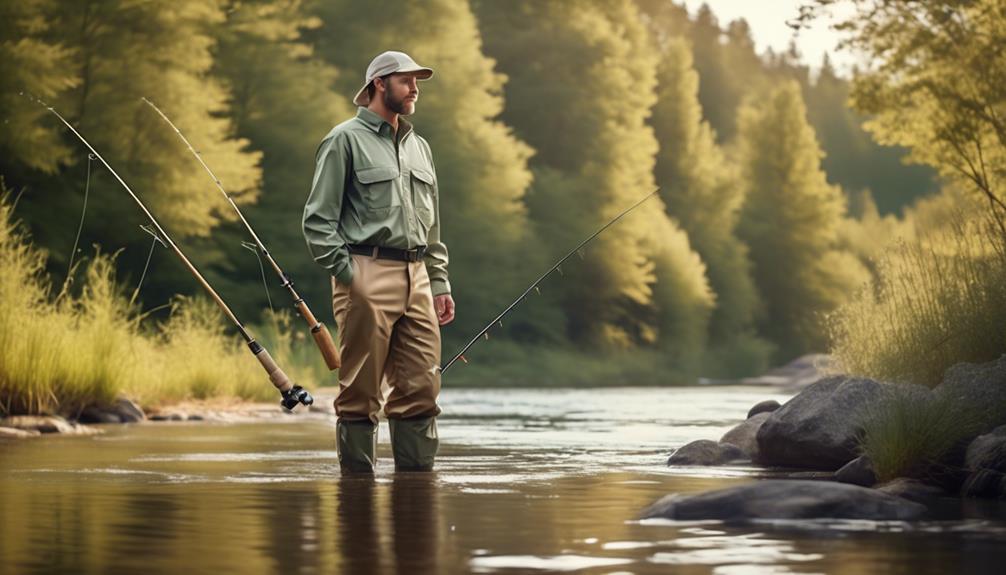
Donning appropriate clothing and footwear can significantly enhance your comfort and mobility during freshwater fishing expeditions. When it comes to clothing, breathable waders are a must-have for any angler. These waders are designed to keep you dry and comfortable while allowing moisture and sweat to escape, keeping you from feeling clammy and hot. Look for waders made from lightweight, breathable materials to ensure maximum comfort during long days on the water.
Additionally, waterproof boots are essential for navigating slippery riverbanks and muddy shores. These boots not only keep your feet dry but also provide excellent traction to prevent slips and falls. Choose a pair with sturdy soles and ankle support for added stability as you move around in various terrains.
In terms of clothing, lightweight, moisture-wicking shirts and pants are ideal for staying cool and dry. A wide-brimmed hat and polarized sunglasses can also offer protection from the sun and improve visibility on the water.
When selecting footwear, comfort and durability should be top priorities. Look for waterproof boots that provide ample ankle support and a secure fit. Additionally, breathable waders are essential for wading in rivers and streams, keeping you dry and comfortable throughout your fishing adventures.
Selecting the right clothing and footwear won't only enhance your angling experience but also provide essential protection from the elements.
Accessories and Extras
To enhance your freshwater fishing experience, consider adding essential accessories and extras to your angling gear. These items can make your time on the water more enjoyable and productive, helping you to be better prepared for a successful fishing trip.
- Fishing Gadgets and Technology: Invest in a quality fish finder to locate the best fishing spots. A waterproof, floating phone case can also come in handy for protecting your phone while out on the water. Additionally, a portable GPS device can help you navigate and mark the locations of prime fishing spots.
- Fishing Apparel and Gear Fashion: Don't overlook the importance of comfortable and functional clothing. Look for UV-protective shirts and hats to shield yourself from the sun's rays. Quality polarized sunglasses can reduce glare and help you see beneath the water's surface. Consider investing in a sturdy, waterproof fishing backpack to keep your gear organized and easily accessible.
- Safety and First Aid Equipment: Pack a compact first aid kit in case of minor injuries. A whistle and a small waterproof flashlight can also be essential in emergencies, ensuring you can attract attention and navigate in low-light conditions.
- Casting Aids and Tackle Management: Improve your casting accuracy with a casting aid. Tackle management systems, such as tackle boxes and bags with multiple compartments, can help keep your gear organized and easily accessible.
Frequently Asked Questions
What Are the Best Techniques for Catching Different Species of Freshwater Fish?
When it comes to catching different species of freshwater fish, bait selection and casting techniques play a crucial role. Understanding fish behavior and habitat preferences is key to success. Different species have specific preferences, so researching their habits can greatly improve your chances.
Experiment with different baits and casting techniques to see what works best for each species. Pay attention to the environment and adjust your approach accordingly.
Are There Any Specific Regulations or Restrictions for Freshwater Fishing in Different Regions?
When it comes to freshwater fishing, it's essential to be aware of fishing regulations and regional restrictions. These guidelines are put in place to support conservation efforts and sustainability initiatives, ensuring that fish populations remain healthy for future generations.
Always check local regulations and restrictions before you head out to fish in different regions. By following these rules, you contribute to the preservation of freshwater ecosystems and the species that inhabit them.
How Can I Properly Maintain and Care for My Fishing Gear to Ensure Its Longevity?
To properly maintain your fishing gear and ensure its longevity, it's essential to clean and store your equipment correctly.
After each use, wipe down your gear to remove any dirt or debris, and store it in a cool, dry place to prevent rust.
Consider using protective coatings and lubricants to safeguard against corrosion.
Regularly inspect and replace any worn or damaged parts to keep your gear in top condition for your next fishing adventure.
What Are Some Tips for Finding the Best Fishing Spots in Freshwater Lakes and Rivers?
When looking for the best fishing spots in freshwater lakes and rivers, start by researching seasonal patterns and fish behavior. Pay attention to water temperature and depth, as well as vegetation and structure.
Look for areas with natural cover and where baitfish congregate. Experiment with different bait selection and techniques to see what works best for the specific location and time of year. Don't be afraid to explore new areas and ask local anglers for advice.
Are There Any Recommended Resources or Organizations for Learning More About Freshwater Fishing Conservation and Sustainability Efforts?
When it comes to learning about freshwater fishing conservation and sustainability efforts, you can find valuable resources and organizations dedicated to promoting sustainable angling practices.
Look into local fishing clubs, state fish and wildlife agencies, and national conservation organizations for information on conservation efforts and sustainable angling practices.
These groups often provide educational materials, workshops, and opportunities to get involved in conservation initiatives to help protect freshwater ecosystems for future generations.
Conclusion
Now that you have your top picks for angling gear, you're ready to hit the freshwater and reel in some big catches.
Remember to pack your tackle box with all the essentials and don't forget your electronic gadgets to help you locate the best spots.
With the right gear and a little bit of luck, you'll be sure to have a successful fishing trip.
Happy angling!
